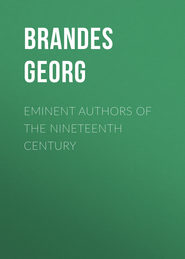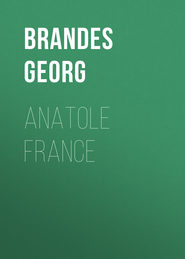По всем вопросам обращайтесь на: info@litportal.ru
(©) 2003-2024.
✖
Main Currents in Nineteenth Century Literature – 3. The Reaction in France
Настройки чтения
Размер шрифта
Высота строк
Поля
55
"Sweet joys of midnight, silent company of mysterious powers, strange revelries of passion, 'tis we alone who know you…
"We alone hear the whispered prayers of sweet desire, and look for ever into-blissful eyes, taste for ever mouth and kiss. All that we touch turns into balsamic fruits, into soft and lovely breasts, ripe food for our desire.
"Anew and ever anew awakes our longing to embrace, to be one with, the beloved, to give him whate'er he asks, sweetly to consume each other, to feed on each other, and on nought else.
"In this voluptuous passion we have revelled ever since the glaring light of earthly life was extinguished, since the faggot flamed, the grave closed on us, and the sights of earth were hidden from the shuddering soul."
56
Auerbach: Deutsche Abende.
57
"The everlasting kingdom is firmly established; strife ends in love and peace; the long and painful dream is at an end; Sophia is priestess of all hearts henceforward and for ever."
58
"From wherever I am, field, forest, valley, meadow, or mountain-top, I send a thousand greetings to my fair and noble lady. In my garden I gather the loveliest flowers that blow; I bind them into wreaths, and bind along with them a thousand thoughts and greetings. I may not give her my flowers; she is too great and beautiful; they wither, every one, but love lives eternally in my heart. In seeming cheerfulness I go about my daily task; my heart is breaking, but I dig and sing, and soon I'll dig my grave."
59
"Fly, cockchafer, fly! Your father is in the wars; your mother is in Pommerland, and Pommerland is on fire. Fly, cockchafer, fly!"
60
"Yes, despise reason and science, the highest possessions of man, let yourself be persuaded by the spirit of lies to believe in hallucinations and magic, and you are mine without fail."
61
"What beautiful image is this that the artist has created? Under what genial sky was this man born? Is there no inscription to tell me his name, since these dead lips are dumb for ever? The eye glows with noble desire; enthusiasm shines from that fair brow, surmounted only by clustering curls, not yet by the laurel wreath. He is a poet. The wondrous smile of love, of life, is on his lips; romance dwells in these thoughtful eyes, drollery in the cheeks' roguish curves. Fame will ere long proclaim his name, and set the crown of laurel on his brow."
62
Gödeke: Grundriss zur Geschichte der deutschen Dichtung, iii., Erste Abth., 31.
63
"Long years ago the nightingale sang as she sings now. How sweet it sounded! We were together then. I sit alone and spin and sing, and cannot weep; clean and strong I spin my thread, as long as the moon shines. The nightingale sang when we were together; now she but reminds me that you have gone from me. It is of you alone that I think in the moonlight; my heart is clean and strong as the thread I spin; may God unite us again."
64
"The ensign came riding, his white flag he waved;
'Stop! here is the pardon – fair Nanerl is saved.'
'O ensign, good ensign, fair Nanerl is dead.'
'Thy soul is with God! Good night, Nanerl!' he said."
65
"It is not, then, so much religion that influences me, as strong affection for the olden times, and grief that we of to-day are so unlike those heroes of the faith."
66
"What I had taken to be ravine and mountain, wood, meadow, and cliff, was one great head, the forest its hair and beard. The giant smiles to see his children happy at their play. He beckons, and straightway through the forest is heard a rustle of holy awe. I fell upon my knees, trembling with fear. I whispered to the little child: 'What is that great being yonder?' The child replied: 'The fear of him comes upon thee because thou hast been permitted to see him without warning; that is our father, our preserver; his name is Pan.'"
67
"Beloved, thou hast pierced my heart,
Oh, bitterer this than hell's worst smart!"
68
"The child, a heavy weight, you have borne;
Flap your wings at the mother, all forlorn;
A weary way you have had to bear it,
Catch hold of her cheek with your bill, and tear it," &c., &c.
69
"In my irritation,
In the journey's agitation,
I crushed the child," &c., &c.
70
Cf. Otto Brahm, Heinrich von Kleist.
71
This speech is taken from the early edition. "To think that he could crush this breast, Prothoe! a breast so full of song, Asteria! At every touch upon its strings it gave forth melody."
72
"The utmost that human powers can do, I have done; setting my all upon one throw of the dice, I have attempted the impossible. There the dice lie – and I have lost, have lost; 'tis this that I must force myself to understand."
73
"Set all the dogs upon him! Drive on the elephants with firebrands, that they may crush him under foot! Press on the chariots, that their scythes may mow his lusty limbs!"
74
"'At him, good dogs!' she cries, 'at him, good Tigris, Leäne, Sphinx, Melampus, Dirke, and Hyrkaon!' and, shouting thus, she rushes madly at him with the pack, and, like a dog among the dogs, catches him by the plume of his helmet and pulls him down, the earth shuddering at his fall. One has him by the neck, one by the breast. Weltering in his blood, he touches her soft cheek and cries: 'Penthesilea! sweet love! art thou beside thyself? Is this the bridal festival thou promisedst?' The lioness, the hungry lioness roaring for her prey on the barren plain, would have listened to him – but she – she tears the breastplate from his breast, and sets her teeth deep in his flesh – she and her hounds in rivalry; Oxus and Sphinx have him by the right breast, she by the left. When I arrived, the blood was streaming from her mouth and hands."
75
"Many is the woman who, with her arms round her lover's neck, has said: 'I love thee so, that I could eat thee.' If the fool tried, she was disgusted. It was not so with me, beloved. When I hung upon thy neck I said it not; I did it. I was not so mad as I seemed to thee to be."







